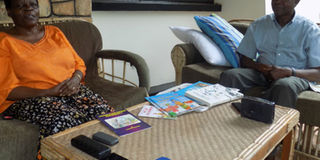30 years writing children stories

Eva Barongo and her husband Yoram Lufunda Barongo (R) at their home in Muyenga, Kampala. Photos by joseph kato
Eva Barongo may not be well known on Muyenga Road where she lives. The children books’ author is better known through her husband, retired Makerere University professor of Political Science, Yoram Lufunda Barongo. But having written children’s books for 30 years now, Eva Barongo’s legacy won’t easily be forgotten.
It is a cold Saturday morning when we sit down for this interview. “I conceived the idea of writing children stories while working as a senior library assistant at Public Library Board in 1985. This was a children’s library. It was adjacent to present day Arua Park. It was a branch of the National Library on Buganda Road,” she says.
Barongo recounts that the library was always supplied with books by the British Council. But before she knew it, the books started vanishing into thin air.
She could hardly identify, guess or suspect anyone who was stealing the books. This put her job in jeopardy as she received several warnings from her bosses over stolen books.
It was then that she decided to investigate how the books were going missing from the library. Since her daily readers were mainly pupils from Bat Valley Primary School, Barongo visited the school administration and asked them why they were sending children to the library during class hours.
Discovering book thefts
That was when she discovered that the children were mainly fees defaulters whose parents had instructed then never to go back home before evening hours. She began suspecting them to be the ones stealing the books. Upon interrogating some of the children, they confessed that they had indeed been stealing the books.
That confession was later to become the idea behind her first book; Our Escape from School was discovered, published in 1990. “This book educates children to distance themselves from bad activities such as stealing because such behaviour could make them lose friends,” Barongo says.
The book, however, did not break through the market as one would anticipate. Barongo attributes this to schools which were only waiting for free books from the British Council as well as lack of interest in local publishers. People often said: “Who can buy a book of someone who spends all the time playing with children.”
Barongo also recalls a time her husband’s friends and in-laws attacked her saying she was embarrassing her husband by working in a children’s library.
She says on several occasions, her in-laws advised her husband to look for another wife and do away with an unserious person whose work was to play with children all day.
“I thank my husband for turning a deaf ear onto those who were destabilising our marriage. We told those who were seeing me as an embarrassment to him never to step foot in our home. They slowly gave up. I am proud of my husband for his endless advice.”
In 1992, Barongo was spotted by a German celebrated child author who offered her a three-months course in Munich where she upgraded her skills in dealing with children. While there, she rubbed shoulders with other writers from countries like Bolivia and India, among others.
However, in a class of 12 students, she was one of the two people who had nothing to show as samples of their work. “I often told the trainers that I had never written any book because I had not travelled with any copy of my book.”
She adds: “I felt embarrassed, but swore not to sit back. I came back very encouraged and determined to extract my potential as far as child authoring was concerned.”
On return, Barongo allied with Ruth Mwayi who was in charge of the National Library. Mwayi was a well-known person and she wanted to capitalise on her friend’s popularity to cut a niche in the authoring industry.
The two published a book, The Mother Bat speaking about good parenting. Indeed her calculations were perfect because they sold several copies to parents and schools and this brought her to fame too.
To date, Barongo has written numerous children’s books though she is mostly proud of four: The Ten Foolish Goats, Ngonzaki and her Decorated Letter, We are all Animals, How Hare became King and Greedy Monkey Loses the Best Friend.
Challenges
Barongo says in Uganda children’s books do not sell because teachers and parents have reduced children to reading just to pass exams.
Teachers often tell children to buy text books so that they can pass very well, something that stales the market for local books.
She decries Ugandan bookshops who duplicate her books and sell them at half the price of the original copy. Barongo adds that she invests so much in paying illustrators, printers and stationery yet the market is small. “I sell my books through visiting schools and at public events such as trade shows,” she says.
In a bid to fight piracy of her books, Barongo and other writers have registered their association known as Children Writers Association (CWA) with Uganda Registration Services Bureau. Among the members are legal officers who work with the police to confiscate books illegally sold in book shops including those that are found in school libraries without the authentication of the author.



